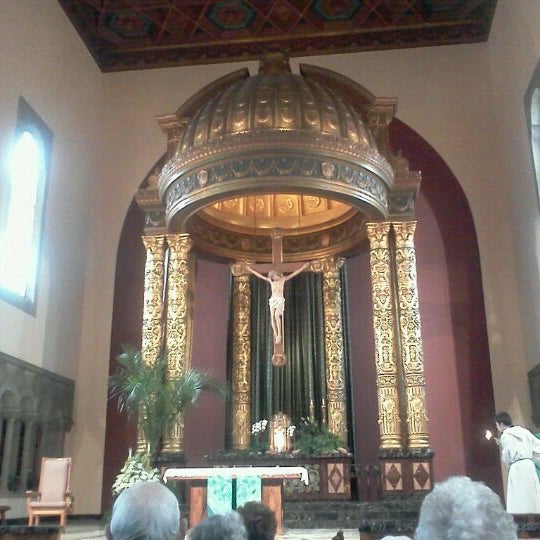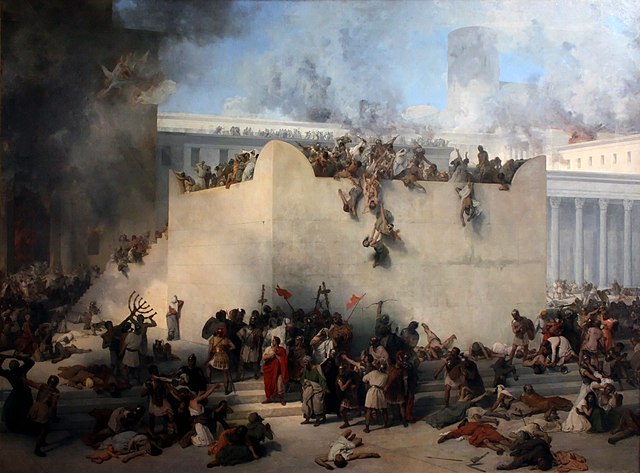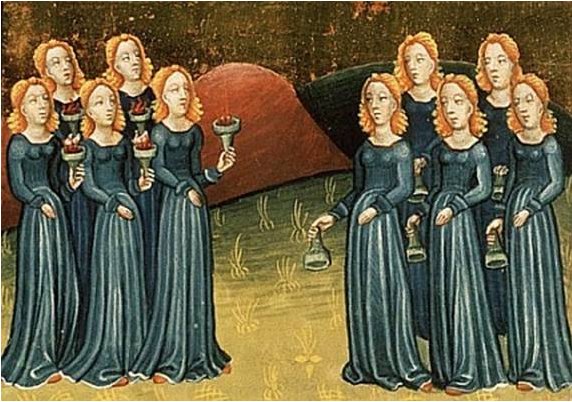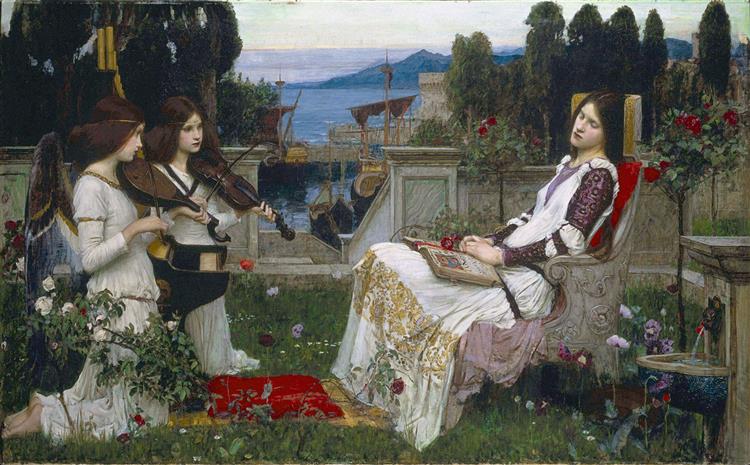CHAP. 25
25:113
1. Then shall the kingdom of heaven be likened unto ten virgins, which took their lamps, and went forth to meet the bridegroom.
2. And five of them were wise, and five were foolish.
3. They that were foolish took their lamps, and took no oil with them:
4. But the wise took oil in their vessels with their lamps.
5. While the bridegroom tarried, they all slumbered and slept.
6. And at midnight there was a cry made, Behold, the bridegroom cometh; go ye out to meet him.
7. Then all those virgins arose, and trimmed their lamps.
8. And the foolish said unto the wise, Give us of your oil; for our lamps are gone out.
9. But the wise answered saying, Not so; lest there be not enough for us and you: but go ye rather to them that sell, and buy for yourselves.
10. And while they went to buy, the bridegroom came; and they that were ready went in with him to the marriage: and the door was shut.
11. Afterward came also the other virgins, saying, Lord, Lord, open to us.
12. But he answered and said, Verily I say unto you, I know you not.
13. Watch therefore, for ye know neither the day nor the hour wherein the Son of man cometh.
CHRYSOSTOM. (Hom. lxxviii.) In the foregoing parable the Lord set forth the punishment of the man who beat, and was drunk, and wasted his Lords goods; in this He declares his punishment who profits not, and does not prepare for himself abundantly the things of which he has need; for the foolish virgins had oil, but not enough.
HILARY. Then, because all this discourse is concerning the great day of the Lord, concerning which He had been speaking before.
GREGORY. (Hom. in Ev. xii. 1.) By the kingdom of heaven is meant the present Church, as in that, The Son of Man shall send forth his angels, and they shall gather out of his kingdom all things that offend. (Matt. 13:41.)
JEROME. This parable of the ten foolish and the ten wise virgins, some interpret literally of virgins, of whom there are according to the Apostle some who are virgins both in body and in thought, (1 Cor. 7.) others who have preserved indeed their bodies virgin, but have not the other deeds of virgins, or have only been preserved by the guardianship of parents, but have wedded in their hearts. But from what has gone before, I think the meaning to be different, and that the parable has reference not to virgins only, but to the whole human race.
GREGORY. (ubi sup.) For in each of the five senses of the body `there is a double instrument, and the number five doubled makes ten. And because the company of the faithful is gathered out of both sexes, the Holy Church is described as being like to ten virgins, where as bad are mixed with good, and reprobate with elect, it is like a mixture of wise and foolish virgins.
CHRYSOSTOM. And He employs the character virgins in this parable to shew, that though virginity be a great thing, yet if it be not accompanied by works of mercy, it shall be cast out with the adulterers.
ORIGEN. Or, The understandings of all who have received the word of God are virgins. For such is the word of God, that of its purity it imparts to all, who by its teaching have departed from the worship of idols, and have through Christ drawn near to the worship of God; Which took their lamps, and went forth to meet the bridegroom and the bridea. They take their lamps, i. e. their natural faculties, and go forth out of the world and its errors, and go to meet the Saviour, who is ever ready to come to enter with them that are worthy to His blessed bride the Church.
HILARY. Or, The bridegroom and the bride represent our Lord God in the body, for the flesh is the bride of the spirit. The lamps are the light of bright souls which shine forth in the sacrament of baptismb.
AUGUSTINE. (Lib. 83 Quæst. q. 59.) Or, The lamps which they carry in their hands are their works, of which it was said above, Let your works shine before men. (Mat. 5:16.)
ORIGEN. They that believe rightly, and live righteously, are likened to the five wise; they that profess the faith of Jesus, but prepare themselves not by good works to salvation, are likened to the five foolish.
JEROME. For there are five senses which hasten towards heavenly things, and seek after things above. Of sight, hearing, and touch, it is specially said, That which we have heard, which we have seen with our eyes, and our hands have handled. (1 John 1:1.) Of taste, Taste and see that the Lord is good. (Ps. 34:8.) Of smell, Because of the savour of thy good ointments. (Sol. Song, 1:3.) There are also other five senses which gape after earthly husks.
AUGUSTINE. (ubi sup.) Or, by the five virgins, is denoted a five-fold continence from the allurements of the flesh; for our appetite must be held from gratification of the eyes, ears, smell, taste, and touch. And as this continence may be done before God, to please Him in inward joy of the conscience, or before men only to gain applause of men, five are called wise, and five foolish. Both are virgins, because both these men exercise continence, though from different motives.
ORIGEN. And because the virtues are so linked together, that he who has one has all, so all the senses so follow one another, that all must be wise, or all foolish.
HILARY. Or, The five wise and five foolish are an absolute distinction between believers and unbelievers.
GREGORY. (ubi sup.) It is to be observed, that all have lamps, but all have not oil.
HILARY. The oil is the fruit of good works, the vessels are the human bodies in whose inward parts the treasure of a good conscience is to be laid up.
JEROME. The virgins that have oil are they who, besides their faith, have the ornament of good works; they that have not oil, are they that seem to confess with like faith, but neglect the works of virtue.
AUGUSTINE. (ubi sup.) Or, The oil denotes joy, according to that, God hath anointed thee with the oil of gladness. (Ps. 45:7.) He then whose joy springs not from this that he is inwardly pleasing to God, has no oil with him; for they have no gladness in their continent lives, save in the praises of men. But the wise took oil with their lamps, that is, the gladness of good works, in their vessels, that is, they stored it in their heart and conscience, as the Apostle speaks, Let every man prove himself, and then shall he have rejoicing in himself, and not in another. (Gal. 6:4.)
CHRYSOSTOM. Or, The oil denotes charity, alms, and every aid rendered to the needy; the lamps denote the gifts of virginity; and He calls them foolish, because after having gone through the greater toil, they lost all for the sake of a less; for it is greater labour to overcome the desires of the flesh than of money.
ORIGEN. Or, The oil is the word of teaching, with which the vessels of souls are filled; for what gives so great content as moral discourse, which is called the oil of light. The wise took with them of this oil, as much as would suffice, though the Word should tarry long, and be slack to come to their consummation. The foolish took lamps, alight indeed at the first, but not supplied with so much oil as should suffice even to the end, being careless respecting the provision of doctrine which comforts faith, and enlightens the lamp of good deeds.
AUGUSTINE. (ubi sup.) For there die of both kinds of men in this interval of time before the resurrection of the dead, and the Lords coming shall be.
GREGORY. (ubi sup.) To sleep is to die, to slumber before sleep is to faint from salvation before death, because, by the burden of sickness we come to the sleep of death.
JEROME. Or, They slumbered, i. e. they were dead. And then follows, And slept, because they were to be afterwards wakened. While the bridegroom tarried, shews that no little time intervened between the Lords first and second coming.
ORIGEN. Or, Whilst the bridegroom tarried, and the Word comes not speedily to the consummation of this life, the senses suffer, slumbering and moving in the night of the world; and sleep, as energizing feebly, and with no quick sense. Yet did those wise virgins not quit their lamps, nor despair of hoarding their oil.
JEROME. The Jews have a tradition that Christ will come at midnight, in like manner as in that visitation of Egypt, when the Paschal feast is celebrated, and the destroyer comes, and the Lord passes over our dwellings, and the door posts of each mans countenance are hallowed by the blood of the Lamb. Hence, I suppose, has continued among us that apostolic tradition, that on the vigil of Easterc the people should not be dismissed before midnight, in expectation of Christs coming; but when that hour has past over, they may celebrate the feast in security; whence also the Psalmist says, At midnight did I rise to praise thee. (Ps. 119:62.)
AUGUSTINE. (ubi sup.) Or, At midnight, that is, when none knew or looked for it.
JEROME. Suddenly thus, as on a stormy night, and when all think themselves secure, at the hour when sleep is the deepest, the coming of Christ shall be proclaimed by the shout of Angels, and the trumpets of the Powers that go before Him. This is meant when it says, Lo, the bridegroom cometh, go ye out to meet him.
HILARY. At the trumpet signal they go forth to meet the bridegroom alone, for then shall the two be one, that is, the flesh and God, when the lowliness of the flesh shall be transformed into spiritual glory.
AUGUSTINE. (ubi sup.) Or, that the virgins go forth to meet the bridegroom alone, I think is to be understood that the virgins themselves constitute her who is called the bride; as we speak of the Christians flocking to the Church as children running to their mother, and yet this same mother consists only of the children who are gathered together. For now the Church is betrothed, and is to be led forth as a virgin to the marriage, which takes place then when all her mortal part having past away, she may be held in an eternal union.
ORIGEN. Or, At midnight, that is, at the time of their most abandoned carelessness, there was a great cry, of the Angels, I suppose, desiring to arouse all men, those ministering spirits crying within in the senses of all that sleep, Behold, the bridegroom cometh, go ye out to meet him. All heard this summons, and arose, but all were not able to trim their lamps fitly. The lamps of the senses are trimmed by evangelical and right use of them; and they that use their senses amiss have their lamps untrimmed.
GREGORY. (ubi sup.) Or, All the virgins arose, that is, both elect and reprobate are roused from the sleep of death; they trimmed their lamps, that is, they reckon up to themselves their works for which they look to receive eternal blessedness.
AUGUSTINE. (ubi sup.) They trimmed their lamps, that is, prepared to give an account of their deeds.
HILARY. Or, the trimming their lamps is the return of their souls into their bodies, and their light is the consciousness of good works that shines forth, which is contained in the vessels of the body.
GREGORY. (ubi sup.) The lamps of the foolish virgins go out, because the works which appeared outwardly to men to be bright, are dimmed within at the coming of the Judge. That they then beg oil of the wise virgins, what is it but that at the coming of the Judge, when they find themselves empty within, they seek for witness from without? As though deceived by their own self-confidence, they say to their neighbours, Whereas ye see us rejected as living without works, do ye witness to our works that ye have seen.
AUGUSTINE. (ubi sup.) From habit, the mind seeks that which uses to give it pleasure. And these now seek from men, who see not the heart, witness to God, who sees the heart. But their lamps go out, because those, whose good works rest upon the testimony of others, when that is withdrawn, sink into nothing.
JEROME. Or, These virgins who complain that their lamps are gone out, shew that they are partially alight, yet have they not an unfailing light, nor enduring works. Whoso then has a virgin soul, and is a lover of chastity, ought not to rest content with such virtues as quickly fade, and are withered away when the heat comes upon them, but should follow after perfect virtues, that he may have an enduring light.
CHRYSOSTOM. Or otherwise; These virgins were foolish, not only because they departed hence, lacking store of mercy, but because they deemed to receive it from those of whom they importunately begged it. For though nothing could be more merciful than those wise virgins, who for this very mercifulness were approved, yet would they not grant the prayer of the foolish virgins. But the wise answered, saying, Not so, lest there be not enough for us and you; hence we lean that none of us shall be able in that day to stand forth as patron1 of those who are betrayed by their own works, not because he will not, but because he cannot.
JEROME. For these wise virgins do not answer thus out of covetousness, but out of fear. Wherefore, each man shall receive the recompense of his own works, and the virtues of one cannot atone for the vices of another in the day of judgment. The wise admonish them not to go to meet the bridegroom without oil, Go ye rather to them that sell, and buy for yourselves.
HILARY. They that sell are the poor, who, needing the alms of the faithful, made them that recompense which they desire, selling in return for the relief afforded to their wants, a consciousness of good works. This is the abundant fuel of an undying light which may be bought and stored up for the fruits of mercy.
CHRYSOSTOM. You see then how great merchants the poor are to us; but the poor are not there, but here, and therefore we must store up oil here, that we may have it to use there when occasion shall require.
JEROME. And this oil is sold, and at a high cost, nor is it to be got without much toil; so that we understand it not of alms only, but of all virtues and counsels of the teachers.
ORIGEN. Otherwise; Notwithstanding they were foolish, they yet understood that they must have light to go and meet the bridegroom, that all the lights of their senses might be burning. This also they discerned, that because they had little of the spiritual oil, their lamps would burn dim as darkness drew on. But the wise send the foolish to those that sell, seeing that they had not stored up so much oil, that is, word of doctrine, as would suffice both for themselves to live by, and to teach others, Go ye rather to them that sell, i. e. to the doctors, and buy, i. e. take of them; the price is perseverance, the love of learning, industry, and toil of all who are willing to learn.
AUGUSTINE. (ubi sup.) Or we may suppose it not meant as advice what they should do, but as an indirect allusion to their fault. For flatterers sell oil, who by praising things false, and things unknown, lead souls astray, recommending to them, as foolish, empty joys, and receiving in return some temporal benefit. Go ye rather to them that sell, and buy for yourselves, i. e. Let us now see what they can profit you who have used to sell you their praise. Lest there be not enough for us and you, because no man is profited in Gods sight by the testimony of others, because God sees the heart, and each man is scarce able to give testimony concerning his own conscience.
JEROME. But because the season for buying was now past, and the day of judgment was coming on, so that there was no room for penitence, they must not now lay up new works, but give an account of the old.
HILARY. The marriage is the putting on of immortality, and the joining together corruption and incorruption in a new union,
CHRYSOSTOM. That, While they went to buy, shews that even, if we should become merciful after death, it will avail us nothing to escape punishment, as it was no profit to the rich man, that he became merciful and careful about those who belonged to him.
ORIGEN. Or, He says, While they went to buy, because there are men to be found who have neglected to learn any thing useful, till when, in the very end of their life, when they set themselves to learn, they are overtaken by death.
AUGUSTINE. (ubi sup.) Or otherwise; While they went to buy, that is, while they turned themselves to things without, and sought to find pleasure in things they had been accustomed to, because they knew not inward joys, came He that judges; and they that were ready, i. e. they whose conscience bore witness to them before God, went in with him to the wedding, i. e. to where the pure soul is united prolific to the pure and perfect word of God.
JEROME. After the day of judgment, there is no more opportunity for good works, or for righteousness, and therefore it follows, And the door was shut.
AUGUSTINE. (ubi sup.) When they have been taken in who have been changed into angelic being (1 Cor. 15:51), all entrance into the kingdom of heaven is closed; after the judgment, there is no more place for prayers or merit.
HILARY. Yet though the season of repentance is now past, the foolish virgins come and beg that entrance may be granted to them.
JEROME. Their worthy confession calling Him, Lord, Lord, is a mark of faith. But what avails it to confess with the mouth Him whom you deny with your works?
GLOSS. (ap. Anselm.) Grief at their exclusion extorts from them a repetition of this title of Lord; they call not Him Father, whose mercy they despised in their lifetime.
AUGUSTINE. (ubi sup.) It is not said that they bought any oil, and therefore we must suppose that all their delight in the praise of men being gone, they return in distress and affliction to implore God. But His severity, after judgment, is as great as His mercy was unspeakable before. But He answered and said, Verily I say unto you, I know you not; by that rule, namely, that the art of God, that is, His wisdom, does not admit that those should enter into His joy who have sought to do in any thing according to His commandments, not as before God, but that they may please men.
JEROME. For the Lord knoweth them that are his, (2 Tim. 2:19.) and he that knoweth not shall not be known, and though they be virgins in purity of body, or in confession of the true faith, yet forasmuch as they have no oil, they are unknown by the bridegroom. When He adds, Watch therefore, because ye know not the day nor the hour, He means that all that has been said points to this, namely, that seeing we know not the day of judgment, we should be careful in providing the light of good works.
AUGUSTINE. (ubi sup.) For indeed we know the day and the hour neither of that future time when the Bridegroom will come, nor of our own falling asleep each of us; if then we be prepared for this latter, we shall also be prepared when that voice shall sound, which shall arouse us all.
AUGUSTINE. (Ep. 199. 45.) There have not been wanting those who would refer these ten virgins to that coming of Christ, which takes place now in the Church; but this is not to be hastily held out, lest any thing should occur contradictory of it.






